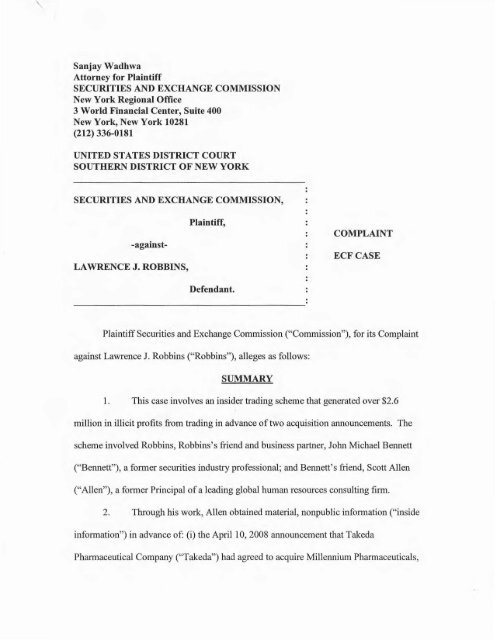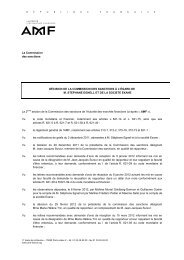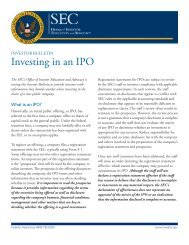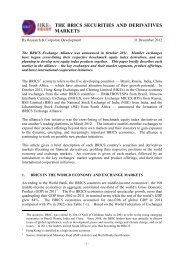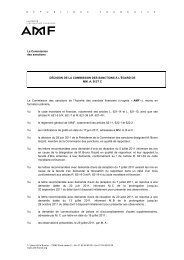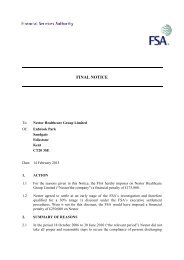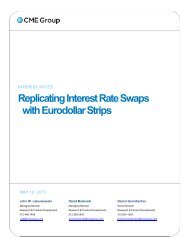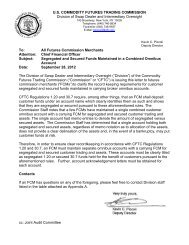SEC Complaint: Lawrence J. Robbins - MemoFin.fr
SEC Complaint: Lawrence J. Robbins - MemoFin.fr
SEC Complaint: Lawrence J. Robbins - MemoFin.fr
Create successful ePaper yourself
Turn your PDF publications into a flip-book with our unique Google optimized e-Paper software.
Sanjay WadhwaAttorney for Plaintiff<strong>SEC</strong>URITIES AND EXCHANGE COMMISSIONNew York Regional Office3 World Financial Center, Suite 400New York, New York 10281(212) 336-0181UNITED STATES DISTRICT COURTSOUTHERN DISTRICT OF NEW YORK<strong>SEC</strong>URITIES AND EXCHANGE COMMISSION,-against-LAWRENCE J. ROBBINS,Plaintiff,COMPLAINTECFCASEDefendant.Plaintiff Securities and Exchange Commission ("Commission"), for its <strong>Complaint</strong>against <strong>Lawrence</strong> J. <strong>Robbins</strong> ("<strong>Robbins</strong>"), alleges as follows:SUMMARY1. This case involves an insider trading scheme that generated over $2.6million in illicit profits <strong>fr</strong>om trading in advance of two acquisition announcements. Thescheme involved <strong>Robbins</strong>, <strong>Robbins</strong>'s <strong>fr</strong>iend and business partner, John Michael Bennett("Bennett"), a former securities industry professional; and Bennett's <strong>fr</strong>iend, Scott Allen("Allen"), a former Principal of a leading global human resources consulting firm.2. Through his work, Allen obtained material, nonpublic information ("insideinformation") in advance of: (i) the April 10, 2008 announcement that TakedaPharmaceutical Company ("Takeda") had agreed to acquire Millennium Pharmaceuticals,
Inc. ("Millennium") through a cash tender offer; and (ii) the September 3, 2009announcement that Dainippon Sumitomo Pharma Co. Ltd. ("DSP") had agreed to acquireSepracor Inc. ("Sepracor") through a cash tender offer. In both instances, Allenmisappropriated the inside information <strong>fr</strong>om his employer and its clients in breach oftheduty of confidentiality he owed to them by tipping Bennett, who, in tum, shared theinformation with his <strong>fr</strong>iend and business partner, <strong>Robbins</strong>. After receiving thisinformation, <strong>Robbins</strong> and Bennett traded prior to the public announcements oftheacquisitions, and collectively reaped over $2.6 million in ill-gotten profits. The tradesmade by <strong>Robbins</strong> alone generated over $1.5 million in ill-gotten profits.NATURE OF THE PROCEEDINGS AND RELIEF SOUGHT3. The Commission brings this action pursuant to the authority conferredupon it by Section 21(d) ofthe Securities Exchange Act of 1934 ("Exchange Act") [15U.S.C. § 78u(d)]. The Commission seeks a permanent injunction against <strong>Robbins</strong>,enjoining him <strong>fr</strong>om engaging in the transactions, acts, practices, and courses ofbusinessalleged in this <strong>Complaint</strong>, and disgorgement of all ill-gotten gains <strong>fr</strong>om the unlawfulinsider trading activity set forth in this <strong>Complaint</strong>, together with prejudgment interest.The Commission also brings this action pursuant to Section 21A ofthe Exchange Act [15U.S.C. § 78u-1] for civil penalties against the defendant under the Insider Trading andSecurities Fraud Enforcement Act of 1988. Finally, the Commission seeks any otherrelief the Court may deem appropriate pursuant to Section 21(d)(5) of the Exchange Act[15 U.S.C. § 78u(d)(5)].2
JURISDICTION AND VENUE 4. This Court has jurisdiction over this action pursuant to Sections 21 (d),21(e), and 27 of the Exchange Act [15 U.S.C. §§ 78u(d), 78u(e), and 78aa].5. Venue lies in this Court pursuant to Sections 21(d), 21A, and 27 of theExchange Act [15 U.S.C. §§ 78u(d), 78u-1 and 78aa] . Certain ofthe acts, practices,transactions, and courses ofbusiness alleged in this <strong>Complaint</strong> occurred within theSouthern District ofNew York. <strong>Robbins</strong> worked at various businesses that maintainedoffices in New York, New York, and resided in New York, New York. In addition, manyofthe communications in furtherance ofthe insider trading alleged in this <strong>Complaint</strong>were made <strong>fr</strong>om, to, or within the Southern District ofNew York.DEFENDANT6. <strong>Robbins</strong>, age 52, resides in New York, New York. From at least January2008 to January 2011, <strong>Robbins</strong> was a co-owner with Betmett of an independent filmproduction company. Prior to forming the independent film production company inOctober 2007, <strong>Robbins</strong> was a partner at an accounting firm.RELEVANT INDIVIDUALS AND ENTITIES7. Allen, age 47, resides in Atlanta, Georgia, and was a Principal ofa leadingglobal human resources consulting firm headquartered in New York, New York, untilOctober 2010. From at least February 2008 to October 2010, Allen conducted business<strong>fr</strong>om his employer's New York and Atlanta offices in its private equity and acquisitionsbusiness.3
8. Bennett, age 50, resides in Norwalk, Connecticut. Prior to co-founding anindependent film production company with <strong>Robbins</strong> in 2008, Bennett worked for a majorWall Street investment bank <strong>fr</strong>om 2005 to 2007.9. Takeda is a Japanese pharmaceutical company, headquartered in Osaka,Japan.10. Millennium, originally formed as a Delaware corporation in 1993, is abiotechnology company that was registered with the Commission pursuant to Section12(b) of the Exchange Act until it was acquired by Takeda on May 14, 2008. Until May2008, Millennium's common stock traded on the Nasdaq, and it filed periodic reports,including Forms 10-K and 10-Q, with the Commission pursuant to Section 13(a) of theExchange Act.11. Sepracor, a Delaware corporation, is a biotechnology companyheadquartered in Marlborough, Massachusetts, that was registered with the Commissionpursuant to Section 12(b) of the Exchange Act until it was acquired by a wholly-ownedsubsidiary ofDSP on October 20, 2009. Until2009, Sepracor's common stock traded onthe Nasdaq, and it filed periodic reports, including Forms 10-K and 10-Q, with theCommission pursuant to Section 13(a) ofthe Exchange Act.12. DSP is a Japanese pharmaceutical company, headquartered in Osaka,Japan.CALL OPTIONS AND PUT OPTIONS13. Equity call options give the buyer the right, but not the obligation, topurchase a company's stock at a set price (the "strike price") for a certain period of time(through "expiration"). In general, one buys a call option when the stock price is4
expected to rise, or sells a call when the stock price is expected to fall. For example, inFebruary or March, 2008, one "April $17.50" call option on Millennium stock wouldgive the purchaser the right to buy 100 shares of Millennium stock for $17.50 per sharebefore the call expired on April 19, 2008 (options generally expire on the third Friday ofthe expiration month) . If Millennium stock went above $17.50 per share before the calloption expired, the call owner could either exercise the call option and acquire the stockat $17.50, or sell the call option, which would have increased in value. If Millennium'sstock price failed to reach the $17.50 strike price before the call option expired and theholder had not sold the option, the call would expire worthless. If at the time ofpurchaseofthe option, the call option strike price is above the price at which the stock is thentrading, the call option is "out-of-the-money," because it would be unprofitable toexercise the call option and pay more for the stock than ifthe stock were purchased on astock market.14. Equity put options give the buyer the right, but not the obligation, to sell acompany's stock at the strike price prior to expiration. In general, one buys a put optionwhen the price is expected to fall, or sells a put option when the stock price is expected torise. Thus, the seller of a put option receives the proceeds ofthe sale of the put option inreturn for undertaking the risk that the value ofthe stock will decline. If the stock priceof the security does not fall below the strike price, the put option expires and the proceedsofthe put option sale constitute profits for the seller.5
FACTS A. The Relationship Between <strong>Robbins</strong>, Bennett, and Allen15. <strong>Robbins</strong> had a close relationship with his business partner, Bennett.Between January 2008 and January 2011, Bennett and <strong>Robbins</strong> worked closely togetheron a daily basis and had desks in the same room. In addition, they participated incharitable activities together and trained for and participated together in cycling events.16. Bennett, in tum, was close <strong>fr</strong>iends with Allen, whom he had known sincethe early 1990s. Bennett was an usher at Allen's wedding in the mid-1990s and listedAllen as an executor ofhis estate in a will he prepared in October 2008.B. Insider Trading Policies of Allen's Employer17. From at least January 2008 through at least October 2010, Allen'semployer maintained policies prohibiting its employees <strong>fr</strong>om using confidentialinformation received during their work on behalf ofits clients to trade in any security orto advise other people to trade in securities based on such nonpublic information. Thepolicies also prohibited all employees <strong>fr</strong>om disclosing confidential client information toanyone outside the firm.18. Despite this duty, as detailed below, Allen misappropriated and disclosedhis employer's clients ' inside information to reap personal benefit and to benefit his close<strong>fr</strong>iend Bennett.C. Insider Trading in Millennium SecuritiesTakeda's Nonpublic Acquisition Discussions with Millennium19. In or about January 2008, representatives ofTakeda and Millenniumbegan negotiating a possible acquisition by Takeda of Millennium. Takeda made a6
nonpublic written offer to buy Millennium's outstanding shares for $23 per share onFebruary 1, 2008 . Between February 1, 2008, and April9, 2008, representatives ofTakeda and Millennium along with their advisors conducted nonpublic negotiations anddue diligence. During these nonpublic discussions, Millennium's stock traded at pricesbetween $12.82 and $16.35 per share.Allen's Receipt of Confidential, Nonpublic Information20. Allen obtained nonpublic information concerning Takeda's offer toacquire Millennium in February 2008. On or about February 13, 2008, Allen's employerbegan advising Takeda in connection with Takeda's negotiations with Millennium. Allenwas one ofthe employees at his firm who knew about Takeda's negotiations withMillennium, having first been informed about his employer's work for Takeda on oraround February 14, 2008.Allen Tips Bennett, and Bennett and <strong>Robbins</strong> Purchase MillenniumSecurities21. On or before February 28, 2008, Allen provided Bennett with insideinformation concerning Takeda's impending cash tender offer to acquire Millennium'sshares.22. Between February 14, 2008, when Allen received the inside informationabout Takeda's proposed acquisition ofMillennium, and February 28 and 29, 2008, when<strong>Robbins</strong> and Bennett began trading Millennium's securities, Allen communicatednumerous times with Bennett.23. For example, at 7:40pm, on February 27, 2008, Allen received an email<strong>fr</strong>om a representative ofTakeda stating that the contemplated offer was for "23,potentially 24 per share." Four minutes later, at 7:44pm, there was a two-minute call7
placed <strong>fr</strong>om Allen's cell phone to Bennett's cell phone, followed by two additional phonecalls between Allen and Bennett, at 8:56pm and 8:57pm. Later that night, at 10:01 pm,there was a 26-minute phone call between Bennett and <strong>Robbins</strong>.24. Similarly, on February 28, 2008, Allen sent an email to a colleagueindicating that Takeda "raised the tender offer price to $25." That day, Allen travelled<strong>fr</strong>om New York to Atlanta, and, at 10:13 pm, there was a phone call placed <strong>fr</strong>om Allen'shome number (in Atlanta) to Bennett's cell phone lasting approximately nine minutes.Shortly after ending his call with Allen, Bennett called <strong>Robbins</strong>'s cell phone <strong>fr</strong>om his cellphone. This call lasted approximately three minutes.25. Allen tipped Bennett with inside information regarding Takeda'simpending acquisition of Millennium. In doing so, Allen misappropriated the insideinformation <strong>fr</strong>om his employer, and his employer's client, Takeda, concerning Takeda'splans to acquire Millennium.26. Bennett, in turn, tipped <strong>Robbins</strong> with inside information regardingTakeda's impending acquisition of Millennium on or before February 28, 2008. DuringFebruary and March 2008, Bennett and <strong>Robbins</strong> maintained an office in MidtownManhattan, and worked in the same room. In addition to working in close physicalproximity, during this time<strong>fr</strong>ame, Bennett and <strong>Robbins</strong> often spoke by telephone multipletimes a day.27. As detailed further below, after receiving this information, both Bennettand <strong>Robbins</strong> traded Millennium securities, including purchasing more than 3,400 out-ofthe-moneycall options.8
Bennett's Millennium Securities Transactions28. Bennett traded on the basis of the inside information provided by Allen bypurchasing Millennium call options in an account he held jointly with his wife at TDAmeritrade. Between February 29 and April2, Bennett invested over $17,100 topurchase 1,090 out-of-the-money Millennium call options.29. Bennett maintained communication with Allen while purchasing theseMillennium securities. For example, Bennett and Allen had telephone calls on the firstthree days that Bennett purchased Millennium call options: Friday, February 29, 2008;Monday, March 3, 2008; and Wednesday, March 5, 2008.<strong>Robbins</strong>'s Millennium Securities Transactions30. <strong>Robbins</strong> learned the inside information concerning Millennium <strong>fr</strong>omBennett and traded on the basis ofit beginning on February 28, 2008.31. In an account at E*Trade, <strong>Robbins</strong> purchased a total of700 shares ofMillennium stock on Thursday, February 28 (500 shares) and Friday, February 29 (200shares), with an average price of$14.32 per share. In an account at Merrill Lynch,<strong>Robbins</strong> purchased a total of2,351 out-of-the-money call options between Friday,February 29, 2008 and Thursday, March 6, 2008. Specifically, <strong>Robbins</strong> purchased: (i)125 May $17.50 call options and 75 May $15 call options on Friday, February 29; (ii)1,100 May $20 call options on Monday, March 3; (iii) 751 May $20 call options onWednesday, March 5, 2008; and (iv) 300 May $20 call options on Thursday, March 6,2008.32. All of the call options <strong>Robbins</strong> purchased had a strike price aboveMillennium's share price, which never closed at a price above $14.11 between February9
29 and March 6. The $20 strike price for all but 200 ofthese call options was more than$5.50- more than 35%- above the highest Millennium share price traded during thistime <strong>fr</strong>ame. In total, between February 28 and March 6, 2008, <strong>Robbins</strong> invested over$46, 100 in Millennium call options and stock.33. <strong>Robbins</strong> sold a total of270 January 2009 put options between FridayFebruary 29, 2008 and Wednesday March 5, 2008, giving his counter-party the right tosell Millennium shares to him for $10. The over $17,500 of proceeds <strong>fr</strong>om these saleswere placed in <strong>Robbins</strong>'s E*Trade Account.34. <strong>Robbins</strong>'s purchases of out-of-the-money call options were his firstoptions transactions in his Merrill Lynch account since he opened the account inNovember 2007. <strong>Robbins</strong> did not obtain authorization to trade options in this MerrillLynch account until Friday February 29, 2008, the first day he purchased Millennium calloptions.35. Like Bennett, <strong>Robbins</strong> purchased Millennium call options on February 29,March 3, and March 5-days that Bennett and Allen had telephone calls. <strong>Robbins</strong>'sMillennium stock purchases in his E*Trade account on February 28 and February 29, andall ofBennett's Millennium option purchases, were placed <strong>fr</strong>om a single IP addressassigned to Bennett's and <strong>Robbins</strong>'s Midtown Manhattan office location and registered to<strong>Robbins</strong>, meaning that these trades were placed <strong>fr</strong>om the same computer or computersusing the same internet connection.The Millennium Acquisition Announcement and Subsequent Sales by<strong>Robbins</strong> and Bennett36. Millennium and Takeda announced Takeda's tender offer acquisition ofMillennium on Thursday, April10, 2008, prior to the opening of the U.S. securities10
markets, by issuing a joint press release. The announcement, among other things, statedthat "Takeda will acquire Millennium for approximately $8.8 billion through a cashtender offer of$25.00 per share." Following this announcement, the price ofMillennium's shares rose <strong>fr</strong>om $16.35 (the closing price on April9) to $24.34 (theclosing price on April 10), an increase of 48.87%.37. On Apri110, <strong>Robbins</strong> sold 1,150 ofthe call options in his Merrill Lynchaccount- almost half ofhis position- for proceeds ofover $514,000.38. Also, on the afternoon ofApril 10, Bennett sold his entire position of1,090 call options <strong>fr</strong>om the TD Ameritrade account he jointly held with his wife forproceeds of over $619,500.39. On Monday April14, 2008, <strong>Robbins</strong> transferred the remaining 1,201 calloptions in his Merrill Lynch account to his E*Trade account, and then sold these calloptions on Tuesday April15 for proceeds of over $618,200. The sale ofthese optionswas the first option transactions in <strong>Robbins</strong>'s E*Trade account since at least July 1, 2007.<strong>Robbins</strong> did not obtain authorization to trade options in his E*Trade account until FridayApril 11, 2008, the trading day prior to the day he transferred the Millennium call optionsto this account.40. In total, <strong>Robbins</strong> made over $1.12 million in ill-gotten profits <strong>fr</strong>om hisMillennium investments and Bennett made over $602,400 in ill-gotten profits <strong>fr</strong>om hisMillennium investments.D. Insider Trading in Sepracor Securities41. A little over a year after their Millennium trades, starting in May 2009,<strong>Robbins</strong> and Bennett again placed option transactions in the securities of another11
pharmaceutical company, Sepracor. Once again, Bennett and <strong>Robbins</strong> traded in thesecurities of an issuer for which Allen was privy to inside information regarding animpending acquisition through his employer. These trades included the purchase of1,950 out-of-the-money Sepracor call options.DSP's Nonpublic Acquisition Discussions with Sepracor42. In the first several months of2009, DSP retained financial advisors andtook other steps in preparing to approach Sepracor regarding a potential transaction.Representatives ofDSP first approached Sepracor's management about a potentialtransaction on May 27,2009. Between May 27,2009 and September 2, 2009, DSP andSepracor along with their advisors conducted nonpublic negotiations and due diligence.During these nonpublic discussions, Sepracor's stock traded at prices between $15.05 and$18.59.Allen's Receipt of Confidential, Non public Information43. Allen obtained nonpublic information concerning DSP's intention to makean offer to acquire Sepracor <strong>fr</strong>om his employer. In May 2009, Allen's employer advisedDSP in connection with DSP' s potential acquisition of Sepracor' s outstanding shares. ByMay 26, 2009, Allen was participating in his employer's due diligence work for DSP inconnection with the Sepracor acquisition.Allen Tips Bennett, and Bennett and <strong>Robbins</strong> Purchase Sepracor Securities44. On or before May 27, 2009, Allen provided Bennett with insideinformation concerning DSP's impending cash tender offer to acquire Sepracor's shares.12
Bennett 's Sepracor Securities Transactions45. Bennett traded on the basis of the inside information provided by Allen bypurchasing Sepracor call options and selling Sepracor put options in a joint account heheld with his wife at E*Trade.46. From May 27, 2009 to July 22, 2009, Bennett spent over $226,000purchasing 1,700 Sepracor call options. The $17.50 strike price on 1,300 ofthe 1,700Sepracor call options Bennett purchased was over $1.00 above Sepracor' s closing priceon each ofthe days that Bennett purchased the options.47. Between May 27 and June 3, 2009, Bennett also sold 250 October putoptions, giving his counter-party the right to sell Sepracor shares to him for $15, and sold100 January 201 0 put options giving his counter-party the right to sell Sepracor shares tohim for $15 on May 28, 2009. The over $61,000 ofproceeds generated by these saleswere placed in Bennett's and his wife's joint E*Trade account.<strong>Robbins</strong> 's Sepracor Securities Transactions .48. After receiving the inside information concerning DSP's potentialacquisition of Sepracor <strong>fr</strong>om Allen, Bennett, in tum, tipped <strong>Robbins</strong> on or before May 27,2009. <strong>Robbins</strong> traded on the basis ofthis information by purchasing Sepracor calloptions and stock and by selling Sepracor put options in an account at E*Trade.49. <strong>Robbins</strong> purchased: (i) 50 October $15 call options on May 27, 2009; (ii)100 October $17.50 call options and 100 January 2010 $15 call options on May 28, 2009;(iii) 240 October $17.50 call options on May 29, 2009; (iv) 60 October $17.50 calloptions on June 1, 2009; (v) 1,000 common shares of Sepracor on June 2, 2009; (vi) 50October $17.50 call options on June 4, 2009; and (vii) 200 October $17.50 call options on13
July 22, 2009. The $17.50 strike price on 650 ofthese 800 call options <strong>Robbins</strong>purchased was over $1.00 above Sepracor's closing price on each of the days that<strong>Robbins</strong> purchased the options. In total, <strong>Robbins</strong> spent over $127,000 to purchaseSepracor call options and Sepracor stock.50. <strong>Robbins</strong> sold, on May 27, 2009, 50 October put options, giving hiscounter-party the right to sell Sepracor shares to him for $15, and on May 28, 2009, 100January 2010 put options that also gave his counter-party the right to sell Sepracor sharesto him for $15. The over $31,000 ofproceeds generated by these sales were placed in<strong>Robbins</strong>'s E*Trade account.51. Certain of Bennett's and <strong>Robbins</strong>'s trades in Sepracor securities wereplaced on the same day and <strong>fr</strong>om the same IP address.The Sepracor Acquisition Announcement and Subsequent Sales by Bennettand <strong>Robbins</strong>52. DSP and Sepracor announced DSP's tender offer acquisition of Sepracoron September 3, 2009, prior to the opening of the U.S. securities markets, by issuing ajoint press release. The press release, among other things, stated that "DSP will acquireSepracor for approximately $2.6 billion through a cash tender offer of$23.00 per share,followed by a merger to acquire all remaining outstanding Sepracor shares at the sameprice paid in the tender offer." Following this announcement, the price of Sepracor'sshares rose <strong>fr</strong>om $18.03 (the closing price on September 2) to $22.80 (the closing priceon September 3), an increase of over 26%.53. After the announcement concerning Sepracor, both <strong>Robbins</strong> and Bennettsold their entire positions in Sepracor. In total, <strong>Robbins</strong> made over $388,000 in ill-gotten14
profits <strong>fr</strong>om his Sepracor investments and Bennett made over $516,000 in ill-gottenprofits <strong>fr</strong>om his Sepracor investments.E. Allen Received a Benefit for Tipping Bennett54. Allen provided inside information to Bennett with the expectation o<strong>fr</strong>eceiving a personal benefit. This benefit included money that Bennett paid Allen.55. Between April21, 2008 and August 16, 2010, that is, after the April10,2008 Millennium announcement and continuing after the September 3, 2009 Sepracorannouncement, Bennett made at least 27 cash withdrawals between $1,500 and $8,000for a total ofover $150,000.56. Between April2008 and March 2009, Allen regularly travelled by subwayto meet Bennett near Bennett's office on the same day as Bennett withdrew cash.57. For example, on July 1, 2008, Bennett withdrew $5,200 <strong>fr</strong>om a Citibankbranch located near his office at 10:52 am. Allen swiped his Metrocard at the 47-50Rockefeller Center subway stop (the subway stop closest to Allen's office) at 12:36 pmand then again at the 59 Street Columbus Circle subway stop (the subway stop closest toBennett's office) at 1:54pm. Also on July 1, 2008, Allen had an appointment on hisOutlook Calendar for 1 pm entitled "BR @ 1," and Bennett had a $106.80 credit cardcharge at Blue Ribbon Sushi, a restaurant located in the Time Warner Center atColumbus Circle.58. Similarly, on December 11, 2008, Bennett withdrew $5,500 <strong>fr</strong>om aCitibank branch located at 4 Columbus Circle at 1:27pm. That same day, Allen swipedhis Metrocard at the 47-50 Rockefeller Center subway stop at 1:30pm and then again atthe 59 Street Columbus Circle subway stop at 1:54pm.15
59. Moreover, even after Bennett's office moved to another location inManhattan in mid-March 2009, Allen and Bennett continued to meet on the same day asBennett withdrew cash. · In fact, on four separate occasions after mid-March 2009, Allenand Bennett used their Metrocards at the exact same time and location on the same daythat Bennett withdrew $5,000 or more of cash <strong>fr</strong>om his bank accounts.60. For example, on October 15, 2009, Bennett withdrew $7,000 <strong>fr</strong>om aCitibank branch located at 4 Columbus Circle at 12:36 pm. A little over an hour later, at1:42pm, Allen and Bennett both swiped their Metrocards at the 59 Street ColumbusCircle subway stop.61. Similarly, on May 18, 2010, Bennett withdrew cash <strong>fr</strong>om a Chase branchlocated near Columbus Circle at 1 :21 pm. Three minutes later, at 1:24pm, both Allenand Bennett swiped their Metrocards at the 59 Street Columbus Circle subway stop.F. Bennett Received a Benefit for Tipping <strong>Robbins</strong>62. In addition to the profits <strong>fr</strong>om his own illicit trades, Bennett also receiveda personal benefit for tipping <strong>Robbins</strong>. After the profitable transactions in Millenniumdescribed above, <strong>Robbins</strong> paid money to Bennett through the independent filmproduction company jointly owned by Bennett and <strong>Robbins</strong>.63. On May 12, 2008, approximately a month after the announcement thatTakeda would purchase Millennium's outstanding shares, <strong>Robbins</strong> transferred $240,000<strong>fr</strong>om his E*Trade account to his personal bank account and instructed his accountant tosend these funds to the independent film production company's bank account. This$240,000 was then paid <strong>fr</strong>om this bank account to Bennett between May 19, 2008 andDecember 12, 2008.16
64. The operating agreement for the independent film production company(the "Operating Agreement") dated May 12, 2008, labeled this $240,000 payment as a"Guaranteed Payment." The Operating Agreement stated specifically that this paymentwould not be deemed to be a distribution and not charged against Bennett's capitalaccount. The Operating Agreement did not provide for <strong>Robbins</strong> to receive any similarpayment.65. <strong>Robbins</strong> also made other substantial investments in the independent filmproduction company.CLAIMS FOR RELIEFCLAIM I Violations of Section lO(b) of the Exchange Act and Rule lOb-S thereunder 66. The Commission realleges and incorporates by reference paragraphs 1through 65, as though fully set forth herein.67. The information concerning Takeda's acquisition of Millennium andDSP's acquisition of Sepracor provided by Allen to his immediate tippee Bennett was, ineach case, material and nonpublic. In addition, the information was, in each case,considered confidential by Allen's employer and its clients, and Allen's employer hadpolicies protecting its own and its clients' confidential information.68. The material nonpublic information concerning Millennium and Sepracorwas provided by Allen to Bennett in breach ofthe fiduciary duty that Allen owed to hisemployer, and Allen provided the information to Bennett with the expectation o<strong>fr</strong>eceiving a benefit <strong>fr</strong>om doing so.69. Bennett tipped <strong>Robbins</strong> material nonpublic information concerningMillennium and Sepracor with the expectation of a benefit <strong>fr</strong>om doing so, and Bennett17
knew, recklessly disregarded, or should have known, that the information was conveyedin breach of a fiduciary duty, or obligation arising <strong>fr</strong>om a similar relationship oftrust andconfidence.70. <strong>Robbins</strong> knew, recklessly disregarded, or should have known, that theinformation that he received concerning Millennium and Sepracor was disclosed ormisappropriated in breach of a fiduciary duty, or similar relationship of trust andconfidence.71. By virtue of the foregoing, <strong>Robbins</strong>, in connection with the purchase orsale of securities, by the use ofthe means or instrumentalities ofinterstate commerce, orofthe mails, or a facility ofa national securities exchange, directly or indirectly: (a)employed devices, schemes or artifices to de<strong>fr</strong>aud; (b) made untrue statements ofmaterialfact or omitted to state material facts necessary in order to make the statements made, inthe light ofthe circumstances under which they were made, not misleading; or (c)engaged in acts, practices or courses ofbusiness which operated or would have operatedas a <strong>fr</strong>aud or deceit upon persons.72. By virtue ofthe foregoing, <strong>Robbins</strong>, directly or indirectly, violated, andunless enjoined, will again violate, Section 10(b) of the Exchange Act [15 U.S.C. §78j(b)] and Rule 10b-5 thereunder [17 C.P.R. § 240.10b-5].CLAIM II Violations of Section 14(e) of the Exchange Act and Rule 14e-3 thereunder 73. The Commission realleges and incorporates by reference paragraphs 1through 72, as though fully set forth herein.74. Prior to the public announcement of the tender offers for Millennium andSepracor and after a substantial step or steps to commence each ofthe tender offers had18
een taken, <strong>Robbins</strong> purchased securities of Millennium and Sepracor while inpossession ofmaterial information relating to the tender offers, which information heknew or had reason to know was nonpublic and had been acquired directly or indirectly<strong>fr</strong>om the offering company, the issuer, or any officer, director, partner, or employee, orother person acting on behalf ofthe offering companies or issuer.75. By reason ofthe conduct described above, <strong>Robbins</strong> violated, and unlessenjoined, will again violate, Section 14(e) ofthe Exchange Act [15 U.S.C. § 78n(e)] andExchange Act Rule 14e-3 [17 C.F.R. § 240.14e-3] thereunder.RELIEF SOUGHTWHEREFORE, the Commission respectfully requests that this Court enter aFinal Judgment:I.Permanently restraining and enjoining <strong>Robbins</strong>, his officers, agents, servants,employees, and attorneys, and those persons in active concert or participation with themwho receive actual notice ofthe injunction by personal service or otherwise, and each ofthem, <strong>fr</strong>om violating Section 10(b) ofthe Exchange Act [15 U.S.C. § 78j(b)] and Rule10b-5 thereunder [17 C.F.R. § 240.10b-5], and Section 14(e) ofthe Exchange Act [15U.S.C. § 78n(e)] and Exchange Act Rule 14e-3 [17 C.F.R. § 240.14e-3] thereunder;II.Ordering <strong>Robbins</strong> to disgorge, with prejudgment interest, all illicit trading profits orother ill-gotten gains received as a result ofthe conduct alleged in this <strong>Complaint</strong>.19
III.Ordering <strong>Robbins</strong> to pay civil monetary penalties pursuant to Section 21A of theExchange Act [15 U.S.C. §78u-1]; andIV.Granting such other and further relief as this Court may deem just and proper.Dated: New York, New YorkSeptember 23, 2013Of Counsel:Amelia A. Cottrell (Cottrella@sec.gov)Charles D. Riely (Rielyc@sec.gov)20


